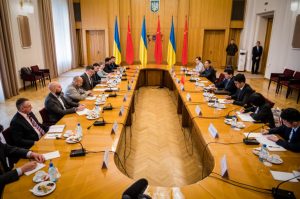“Starting from March 2, Special Representative of the Chinese Government for Eurasian Affairs Li Hui will visit Russia, the EU headquarters, Poland, Ukraine, Germany and France for the second round of shuttle diplomacy on seeking a political settlement to the Ukraine crisis,” China’s Foreign Ministry spokesperson announced at a press conference this week. As anticipation mounts for the outcomes of this tour, pressing questions arise: Will the results diverge from those of the first round of China’s shuttle diplomacy? If the West is draining its resources and attention on Ukraine and Russia is becoming more dependent on China, why would China want this war to end?
During China’s first round of shuttle diplomacy from May 15 to 26, 2023, Li Hui – who served as China’s ambassador to Russia from 2009-2019 – engaged in discussions on the political settlement of the Russia-Ukraine conflict with key stakeholders, including Ukraine, Poland, France, Germany, the EU headquarters in Brussels, and Russia. The visit did not lead to significant progress or agreements between the conflicting parties.
Despite China’s assertions of neutrality, doubts lingered among some parties regarding its impartiality, with concerns raised by Ukraine about a potential pro-Russian bias due to China’s “no-limits” friendship with Russia. Efforts by China to bridge differences with Europe on its role in the conflict were met with continued skepticism, with certain quarters viewing China’s position as aligning with Russia’s interests. Controversial statements by Lu Shaye, China’s ambassador to France, who said that former Soviet countries like Ukraine have no “effective status” in international law, only increased doubts about China’s stance on the conflict resolution process.
On October 11, 2022, Ukraine’s President Volodymyr Zelenskyy announced to the leaders of the Group of Seven (G7) countries a “peace formula” to overcome the Russian threat. The 10-point peace plan emphasizes the restoration of Ukraine’s territorial integrity and adherence to the United Nations Charter, advocating for the withdrawal of Russian troops and the cessation of hostilities to achieve long-lasting peace. It calls for the release of prisoners and deportees, the establishment of a special tribunal for war crimes, and the prevention of further escalation through renewed security guarantees for Ukraine and a revamped security architecture in the Euro-Atlantic space.
Compared to Ukraine’s plea for a peaceful resolution to the conflict and its comprehensive “peace formula” presented to the G-7, China’s own peace proposal appears to fall short of addressing the core issues of the crisis.
On February 18, 2023, China unveiled its proposals for a peaceful resolution to the war between Ukraine and Russia. The 12-point document outlined China’s stance on the “political settlement of the Ukraine crisis.” While ostensibly advocating for peace, the document lacked specific proposals for resolving key issues in the conflict, reflecting China’s reluctance to involve itself in the crisis deeply. Despite officially supporting Ukraine’s sovereignty, Chinese diplomats have echoed Russia’s narrative, attributing the conflict to NATO expansion, condemning unilateral sanctions and the Western disregard for Russian security concerns. This delicate balancing act allows China to benefit from the conflict’s diversion of U.S. resources and the weakening of Russia, all while maintaining crucial economic relationships.
At the Munich Security Conference on February 17, 2024, Foreign Minster Wang Yi’s remarks offered little substance regarding the resolution of the war in Ukraine. Despite asserting that China neither instigated nor directly participated in the crisis, Wang provided no concrete proposals for ending the conflict, either. He emphasized that the conditions were not ripe for peace talks between Ukraine and Russia, indicating China’s reluctance to engage in mediation efforts actively.
During his meeting with Ukrainian counterpart, Dmytro Kuleba, Wang received a briefing on Ukraine’s plans for a high-level meeting to address the conflict, but a subsequent readout from Beijing did not mention the proposed summit. This reluctance to acknowledge or participate in diplomatic initiatives suggests that China perceives the Russia-Ukraine conflict as an internal matter best left to the parties involved, as evidenced by Beijing’s characterization of the conflict as akin to “two brothers fighting each other.” This stance indicates that China is not yet inclined to take a more active role in resolving the crisis.
Despite its second round of shuttle diplomacy, China remains hesitant to engage fully in genuine negotiations at this stage. The discussions at the Munich Security Conference did not indicate any shift toward increased involvement from China.
As the conflict in Ukraine continues to drain U.S. resources and increase Russia’s dependence on China, Beijing benefits from not genuinely mediating in the conflict. It may be in China’s interests to play for time.
Former President Donald Trump has contemplated arranging talks between Zelenskyy and Russian President Vladimir Putin in a potential second term, a departure from longstanding U.S. policy. An adviser to Trump proposed that the suspension of U.S. military aid could motivate Ukraine to participate in negotiations, while the promise of increased assistance might prompt Russia to engage in diplomatic discussions. Pursuing such initiatives risks unsettling established defense alliances crucial to European security since the Cold War while also raising concerns among Asian allies about the United States’ commitment to countering China’s influence in the region.
China stands to gain from a protracted conflict, and therefore, the upcoming second round of shuttle diplomacy will be merely symbolic.
































